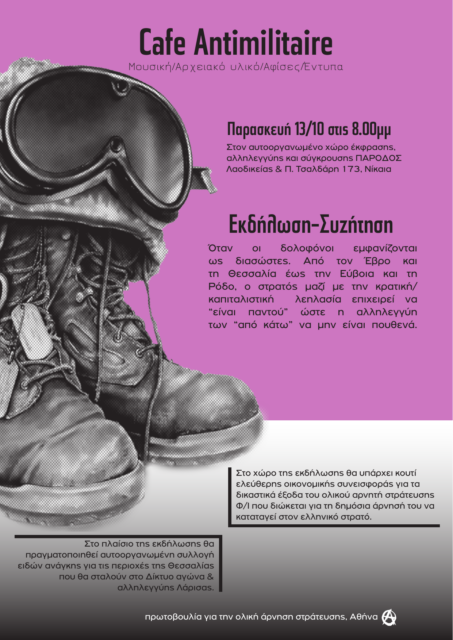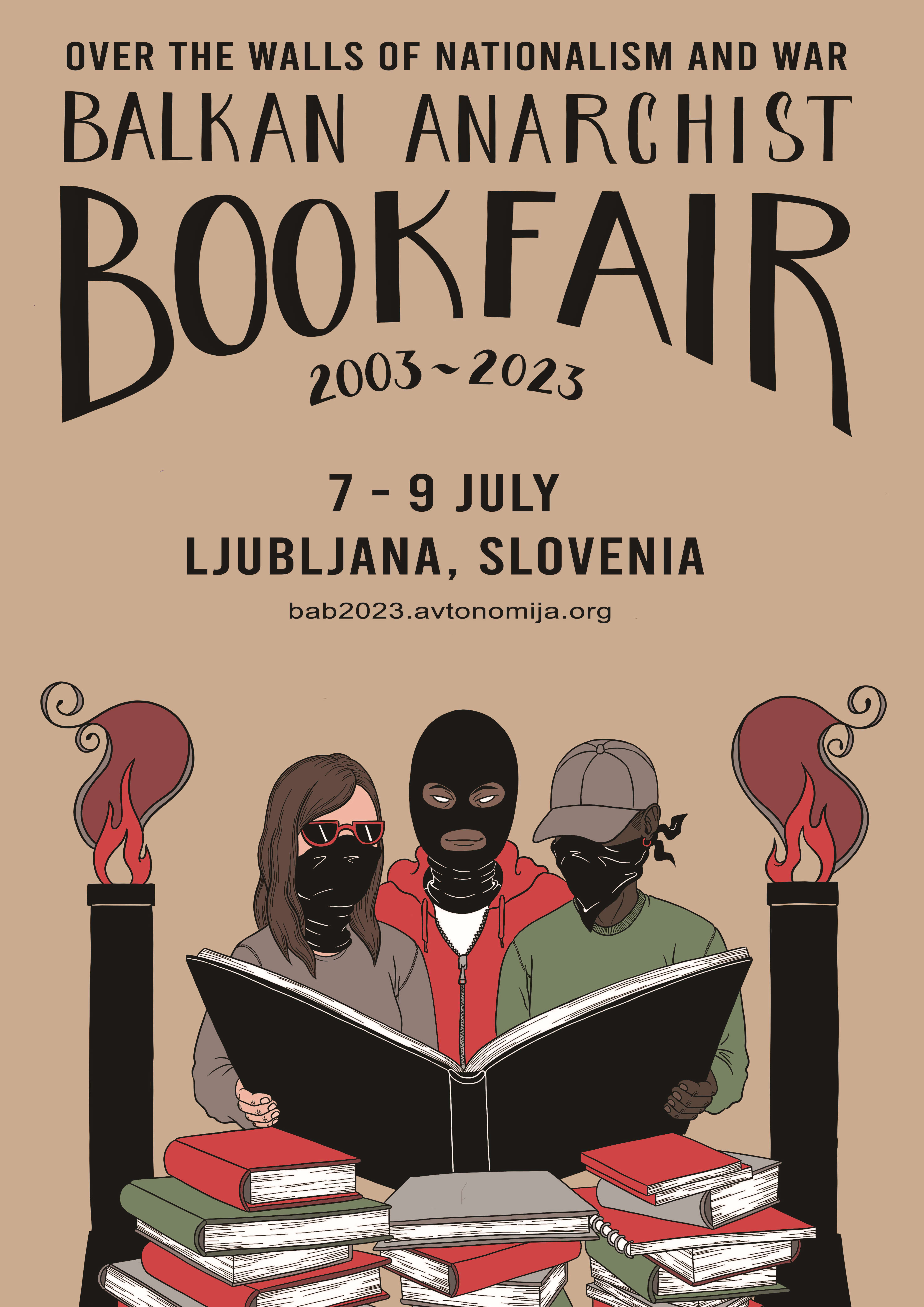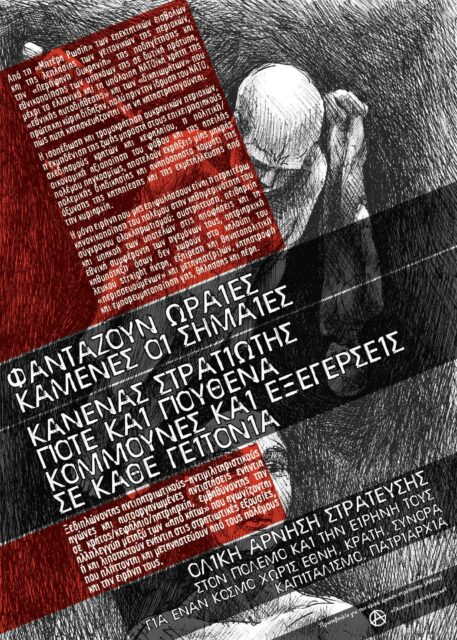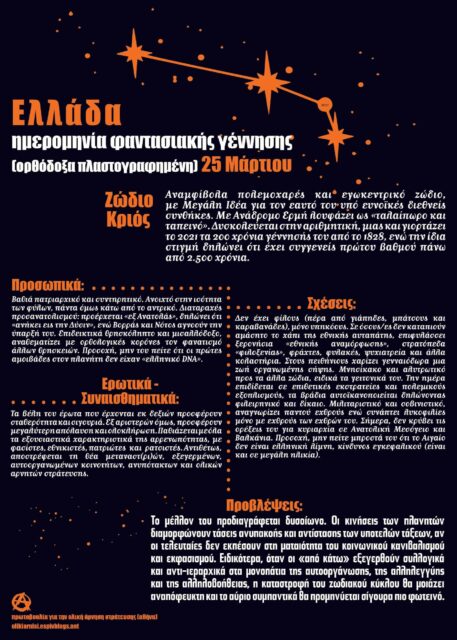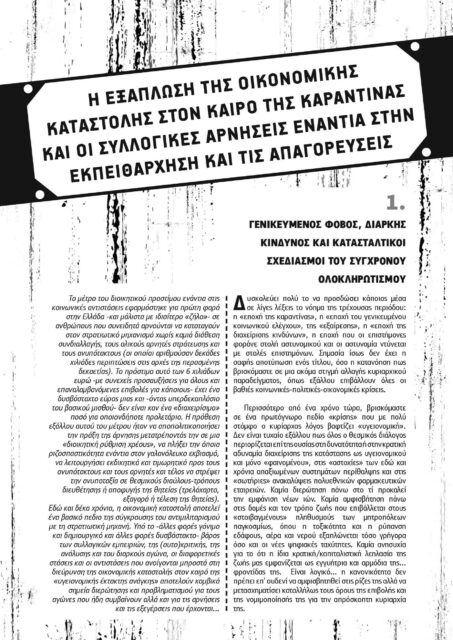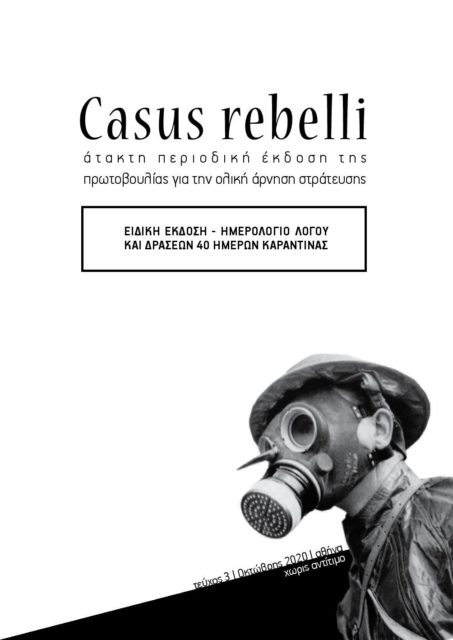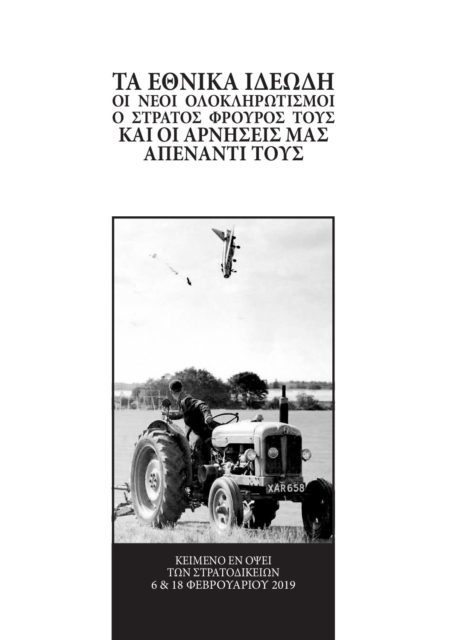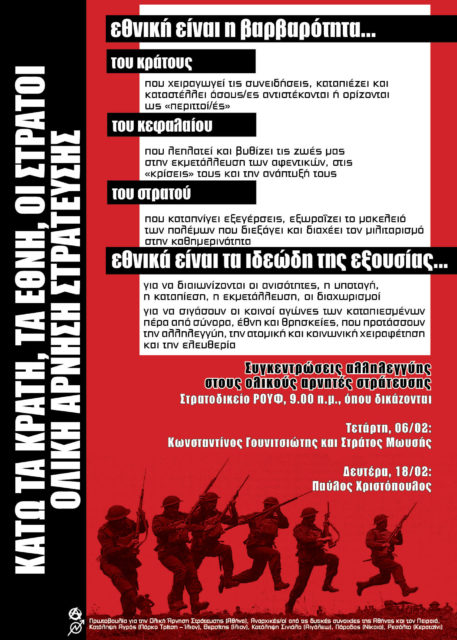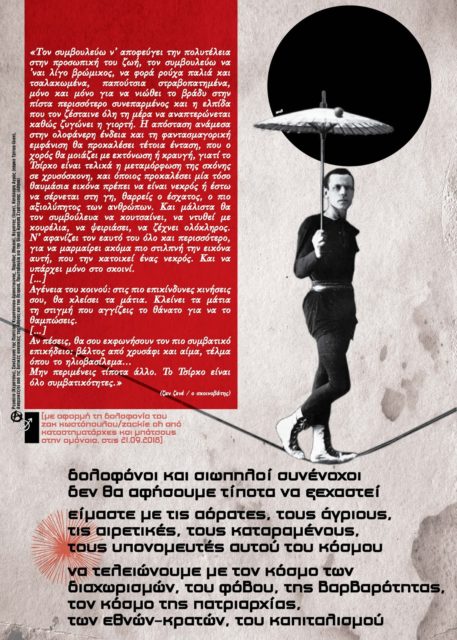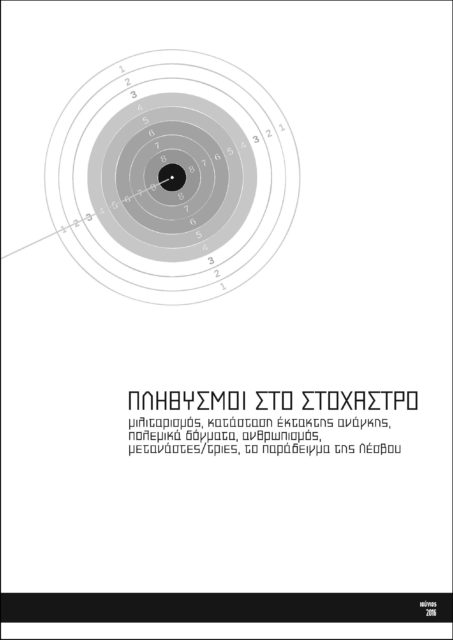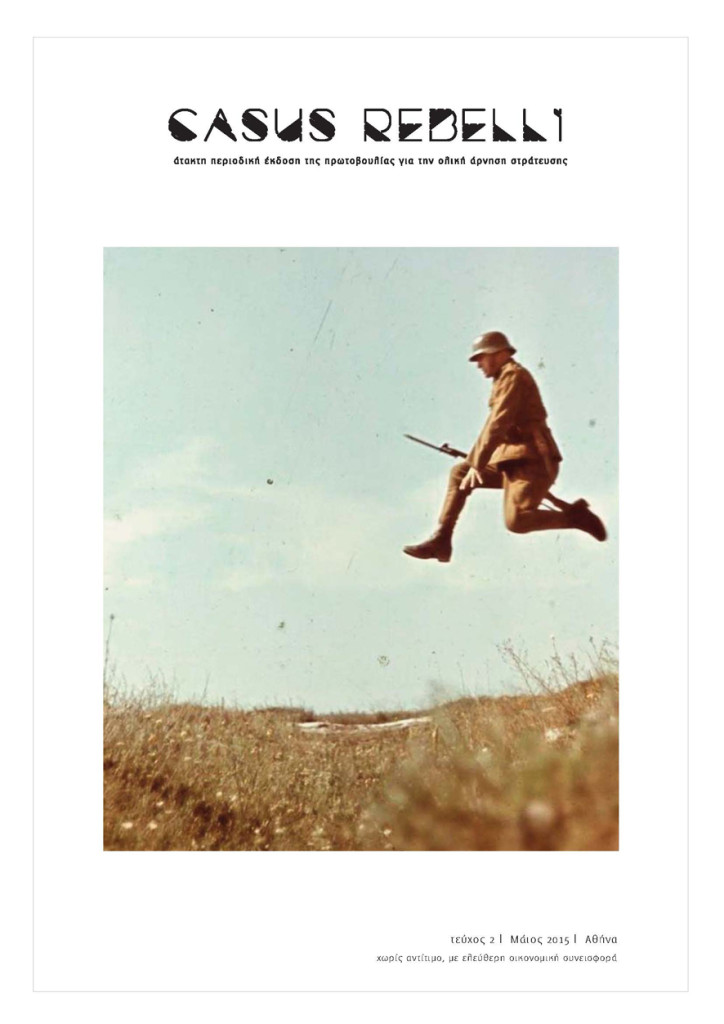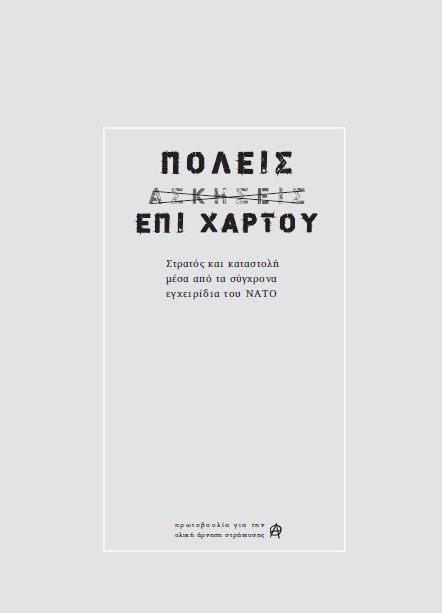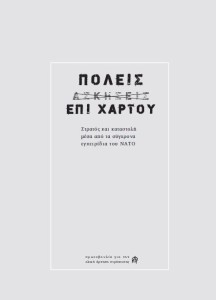 Το βιβλίο «Πόλεις επί χάρτου-Στρατός και καταστολή μέσα από τα σύγχρονα εγχειρίδια του ΝΑΤΟ» τυπώθηκε στην Αθήνα τον Μάιο του 2013, σε 2.000 αντίτυπα. Διακινήθηκε με ελεύθερη οικονομική συνεισφορά σε αυτοδιαχειριζόμενους χώρους και καταλήψεις. Εάν επιθυμείτε κάποια από τα λίγα αντίτυπα του βιβλίου που υπάρχουν ακόμη προς διάθεση μπορείτε να επικοινωνήσετε ηλεκτρονικά στο μέιλ της Πρωτοβουλίας. Το περιεχόμενο του βιβλίου διατίθεται ελεύθερα προς σκέψη και χρήση για κινηματικούς σκοπούς.
Το βιβλίο «Πόλεις επί χάρτου-Στρατός και καταστολή μέσα από τα σύγχρονα εγχειρίδια του ΝΑΤΟ» τυπώθηκε στην Αθήνα τον Μάιο του 2013, σε 2.000 αντίτυπα. Διακινήθηκε με ελεύθερη οικονομική συνεισφορά σε αυτοδιαχειριζόμενους χώρους και καταλήψεις. Εάν επιθυμείτε κάποια από τα λίγα αντίτυπα του βιβλίου που υπάρχουν ακόμη προς διάθεση μπορείτε να επικοινωνήσετε ηλεκτρονικά στο μέιλ της Πρωτοβουλίας. Το περιεχόμενο του βιβλίου διατίθεται ελεύθερα προς σκέψη και χρήση για κινηματικούς σκοπούς.
Αυτή η έκδοση αποστρέφεται κάθε αναπαραγωγή της από θεσμούς και ακολουθητές του θεάματος, του εμπορεύματος, των έντυπων και ηλεκτρονικών ΜΜΕ και από οτιδήποτε στηρίζει (ή στηρίζεται από) έναν κόσμο ιεραρχίας και βαρβαρότητας.
Για να κατεβάσετε το βιβλίο «Πόλεις επί χάρτου» σε ηλεκτρονική μορφή, πατήστε εδώ.
.
Λίγα λόγια για την έκδοση
Αφετηρία της έκδοσής μας, στάθηκε η μετάφραση δύο κινηματικών εντύπων που εκδόθηκαν πρόσφατα σε Ιταλία και Ισπανία (Nonostante Milano: «Eserciti nelle strade», Ιταλία, Μάιος 2009 – Bardo Ediciones: «Ejercitos en las calles», Ισπανία, Γενάρης 2010) καθώς επίσης και ένα ήδη μεταφρασμένο κάλεσμα σε αντιμιλιταριστική κινητοποίηση στη Γερμανία («War starts here camp», Σεπτέμβρης, 2012). Επιχειρώντας να συνθέσουμε μία όσο το δυνατόν πιο συνολική περιγραφή των ζητημάτων που ανοίγονται και ανάγονται από ένα τέτοιο πεδίο, αλλά και μία αποτύπωσή τους στην ελληνική πραγματικότητα, προσθέσαμε από την πλευρά μας ένα υλικό που συνδέει τους κατασταλτικούς σχεδιασμούς με το πλαίσιο εφαρμογής τους, την ιστορική τους συνέχεια και την επικαιροποιημένη -στην τρέχουσα και κρίσιμη συγκυρία- προβολή τους.
Η Οργάνωση του Βορειοατλαντικού Συμφώνου, το ΝΑΤΟ, αποτελεί έναν κορυφαίο -προφανώς όχι το μόνο- στρατιωτικοπολιτικό μηχανισμό. Η στρατιωτική/πολιτική ισχύς του όπως και το ενδιαφέρον του για την εσωτερική καταστολή και εποπτεία είναι αδιαμφισβήτητα. Από τη μια η διατήρηση της ισχύος των κρατών-μελών του και των συνεργατών τους στα κατεκτημένα εδάφη (βλ. Ιράκ, Αφγανιστάν) και από την άλλη ο έλεγχος των ταξικών και κοινωνικών συγκρούσεων στο εσωτερικό των κρατών-μελών της συμμαχίας.
Η παρούσα έκδοση έρχεται σε μια εποχή όπου ο μιλιταρισμός λαμβάνει έναν κεντρικό ρόλο προκειμένου να οργανώσει τις μεθόδους καταστολής του «εσωτερικού εχθρού». Επ’ αφορμής της έκθεσης του ΝΑΤΟ με τίτλο «Επιχειρήσεις σε αστικό περιβάλλον το έτος 2020», αλλά και βάσει άλλων κατ’ ευφημισμόν «νέων» κατασταλτικών δογμάτων, αποτυπώνεται η σημασία των στρατιωτικών δομών -και του ελληνικού στρατού μεταξύ αυτών- στην καταστολή του «εσωτερικού εχθρού». Παράλληλα, παρατίθεται η εξουσιαστική γεωμετρία στην οποία ισορροπούν και αλληλοδιαπλέκονται στρατοί και αστυνομίες διαφόρων ειδών -μία γεωμετρία που καθιστά θολά τα άλλοτε διακριτά τους όρια.
Αξίζει να τονιστεί ότι η έκδοση αυτή χαρακτηρίζεται από μία κρίσιμη αμεσότητα παρά από μία «εκ του ασφαλούς» αποστασιοποίηση. Δεν είναι απλά, η εδώ και δεκαετίες συμμετοχή του ελληνικού κράτους στη ΝΑΤΟϊκή συμμαχία που το έχει καταστήσει -παρά τη σχετικά μικρή επιρροή του- σε ένα οργανικό κράτος-μέλος, του οποίου η συμβολή δεν μπορεί να ειδωθεί ούτε ως αμελητέα ούτε ως αδιάφορη. Είναι κυρίως ότι, σε συστημική και κοινωνική βάση, η ελλαδική επικράτεια αποτελεί ένα σημείο αναφοράς για την εφαρμογή των στρατοκρατικών κατασταλτικών αντιλήψεων.
Ένα κράτος σε βαθιά οικονομική και πολιτική κρίση, μία κοινωνία που δοκιμάζεται στη ραγδαία φτωχοποίηση και υποβάθμιση, ανεξάντλητες μεταναστευτικές ροές από τις αλλεπάλληλες καταστροφές, την οικονομική αφαίμαξη και τους πολέμους σε άλλα κράτη, εντεινόμενος αστικός συγκεντρωτισμός και κοινωνική περιθωριοποίηση.
Από την άλλη, μία κοινωνική εξέγερση το Δεκέμβρη του 2008, σε μία «δυτική» και «ανεπτυγμένη» κοινωνία που τάραξε το κρατικά/καπιταλιστικά διευθυντήρια όχι μόνο εγχώρια αλλά διεθνώς. Κι όλα αυτά, σε μία επικράτεια όπου οι συνεχείς αγώνες, οι έντονες κοινωνικές/ταξικές συγκρούσεις και ζυμώσεις συνθέτουν μία εύθραυστη ισορροπία η οποία, κατά γενική ομολογία, είναι ικανή να παράξει ένα νέο κύκλο αναταραχών και γενικευμένης συστημικής αστάθειας.
Ως μία συλλογικότητα που έχει λάβει ξεκάθαρη θέση στο πεδίο του κοινωνικού/ταξικού ανταγωνισμού, και μία ακόμα πιο ξεκάθαρη στο ζήτημα του στρατού και του μιλιταρισμού, δεν διεκδικούμε καμία ουδετερότητα ή ίσες αποστάσεις στην έκδοση αυτή, όπως επίσης και καμία εξειδίκευση ή επιστημονισμό πάνω στην ανάλυση ενός κόσμου τόσο ξένου προς τις αξίες και τις σχέσεις μας. Τυχόν λάθη και παραλείψεις είναι ίσως κάτι αναπόφευκτο σε μία τέτοια προσπάθεια. Στόχος μας δεν είναι να «κλείσουμε» αλλά να «ανοίξουμε», ακόμα και με τις όποιες αδυναμίες μίας τέτοιας έκδοσης, έναν διάλογο που κρίνουμε ότι έχει καθυστερήσει χαρακτηριστικά να αναπτυχθεί, πόσο μάλλον με τα δεδομένα της κρίσιμης σημερινής συγκυρίας και της εν εξελίξει συστημικής θωράκισης απέναντι στις αντιστάσεις που έρχονται. Αποσκοπούμε στην αντιπληροφόρηση, την εργαλειακή ενδυνάμωση αλλά και στην αναζήτηση των κατάλληλων κατευθύνσεων υπέρ των αγώνων που δίνονται καθημερινά ενάντια σε κάθε μορφής εξουσία, υπέρ της εξεγερσιακής δυνατότητας προς μία κοινωνία αλληλεγγύης και ελευθερίας, ενάντια σε κάθε είδους και χρώματος στρατούς.
.
.
Tabletop cities
Soldiers measure the distance between being and zero with binoculars standing behind tanks. We measure the distance between our body and the missiles with only our six senses.
Mahmout Darouis, Under Seige
.
Brutality and destructions of great armed conflicts – between states or social/political groups within them – have attributed to the concept of war a charged but narrow meaning, cut off from social, political and financial conflicts which are continuous and characterize life “beyond the trenches”. Yet war, as a process, is a constituent feature of how state and capital function and it is through this function that authoritative relations “breathe”, expand and are restructured as far as their influence can reach. Ας internal conflicts within capitalist states always destabilize or question systemic flows of power, war philosophy is also “internally” activated, it adapts to the characteristics of every “area of conflict”, while it adapts the latter to its standards.
In modern states, populated by millions of people crowded in cities, urban space – which at the same time expands to serve capitalist commands – turns into an open area of class and social conflicts which threatens the cohesion of the exploitative system. Thus, from the view of dominance, there is a permanent need to control and repress those “below” which focuses on and specializes in the actual urban territory.
In this framework, militarism takes on a central role in order to organise the methods of repression of each “internal enemy”. Military structures – formed in national, international or supranational frameworks – constitute a comprehensive matrix of producing and diffusing doctrines and perceptions about repression. Doctrines and perceptions that not only define central strategies of enslaving populations, but also embody military values into social consciousness and militarise everyday social life.
North Atlantic Treaty Association, NATO, is a leading – not the only one obviously – military-political structure. Its military/political power took planetary dimensions after the fall of the USSR, decisively determining geostrategic balances and capitalist flows of the western block of dominance in post-soviet era. Its interest both in internal repression and supervision is unquestionable and of double origin. On the one hand, the preservation of power of its member-states over conquered territories (cf. Iraq, Afghanistan), and on the other hand, the internal control of class and social conflicts at each member-state of the Association.
This publication focuses on that second aspect. Without forgetting or underplaying the geostrategic function of NATO, what is being attempted is an overview of its more hidden role within states themselves. Starting from the NATO’s report entitled “Urban Operations in the year 2020” and based on others euphemistically “new” repressive doctrines, what is demonstrated is the significance of military structures – including the greek army – in repressing “internal enemy”. At the same time, what is presented is the authoritative geometry upon which various kinds of army and police balance and interact – a geometry that blurs the boundaries that used to be distinct.
What is worth emphasizing is that this publication is characterized by a critical directness rather than a “safe” distance. It is not just – for decades now – the participation of the greek state in the NATO coalition that has made it an organic member-state (the contribution of which cannot be considered neither unimportant nor minimal in spite of its minor influence). It is mostly that, on a systemic and social basis, greek territory is a point of reference for the implementation of military and state repressive perceptions. A state in a deep financial and political crisis, a society enduring rapid poverty and degradation, with inexhaustible migrant flows caused by consecutive destructions, financial draining and wars in other states, intensified urban centralisation and social marginalisation. On the other hand, the December 2008 uprising, occurring in a “western” and “developed” society, that upset state/capitalist directorates, both national and international. And all that, in a territory where constant struggles, intense social/class conflicts and fermentation processes among those below create a fragile balance which, as it is generally admitted, is capable of producing a new cycle of riots and general systemic imbalance.
The starting point of this publication is our translation – with the vital assistance of two other comrades not participating in the initiative – of related activist texts recently published in Italy and Spain, together with an already translated call for an antimilitarist rally in Germany. By attempting to compose as completely as possible an account of the issues that open up and are deduced from such a field of interest, and to map out the trace they leave in greek reality, we have also added a material that connects the plans of repression with the framework of their application, their historical continuity and their contemporary – at the current, critical situation – projection. More specifically:
In the 1st chapter of Part A, entitled “60 years of (un)balanced terror”, a short overview is presented concerning the creation, development and workings of NATO until today. A short historical account of internal and external antagonisms, immediate war operations and critical balances up until the recent evolution of its profile in accordance with the decisions reached at its last summits (cf. Lisbon, 2010).
In the 2nd chapter entitled “Back to the future: «New» doctrines of repression from the old days” the historicity of authoritative doctrines and perceptions related to supervision and repression in urban space is mapped out, starting from the end of the World War II until today. A sort of genealogy of internal repression and institutional/ideological continuity of various structures that produce this kind of strategies, NATO itself being an unquestionable part of them.
In the 3rd chapter entitled “Greek army: old and new recipes of repression”, what is demonstrated is the historicity and current reality of the greek state concerning the involvement of the army in repressing “internal enemy”. The relatively delayed organic interconnection of the greek army with contemporary international repressive doctrines, is mostly related to its heavy history in internal repression – compared to other states of the coalition – rather than the opposite. Then, through registering institutional developments and facts during the last years, what is described is the methodical and gradual return of the “iron guard” when it comes to matters of internal policing and repression, amidst the current unstable systemic environment of the greek state.
Finally, instead of some final theoretical or political conclusions, we formulate an “open epilogue” with a view to the struggles to come, the roads to be opened and the solidarity awaiting to unfold. An epilogue which is “open” to all those who resist authoritarian commands. For all those that will decide if and how this epilogue might “close” for good, leaving state and capital brutality completely behind.
Hereupon, in Part B – after a short introduction of ours –translations of italian and german texts are presented which not only provide analyses, but also propose forms of resistance. Texts, in which certain individual differences concerning methodological tools and approaches do not hinder us from integrating them in this publication as necessary and important parts of it, as useful and comradely views of the same enemy, the same methods of repression, originating from various parts of the european continent.
As a collectivity that has adopted a clear stance in the field of social/class antagonism, and an even more clear stance concerning the questions of army and militarism, we do not claim to be neutral whatsoever in this publication. We also do not claim any specialisation or scientism in analyzing a world so alien to our values and relationships. Mistakes and omissions may be unavoidable in such an attempt. Our goal is not to “close” but to “open” – despite the possible weaknesses of such a publication – a discussion, the initiation of which has been remarkably delayed. This discussion should be particularly developed even more now that the conjuncture is critical and a systemic armoring against resistance to come is under way.
We aim at counter-information, at the empowerment of our tools and also seek after the right directions in favour of the struggles that daily take place against any form of authority and of the revolting possibility with a view to a society of solidarity and freedom, against armies of any kind and colour.
Κράτα το



